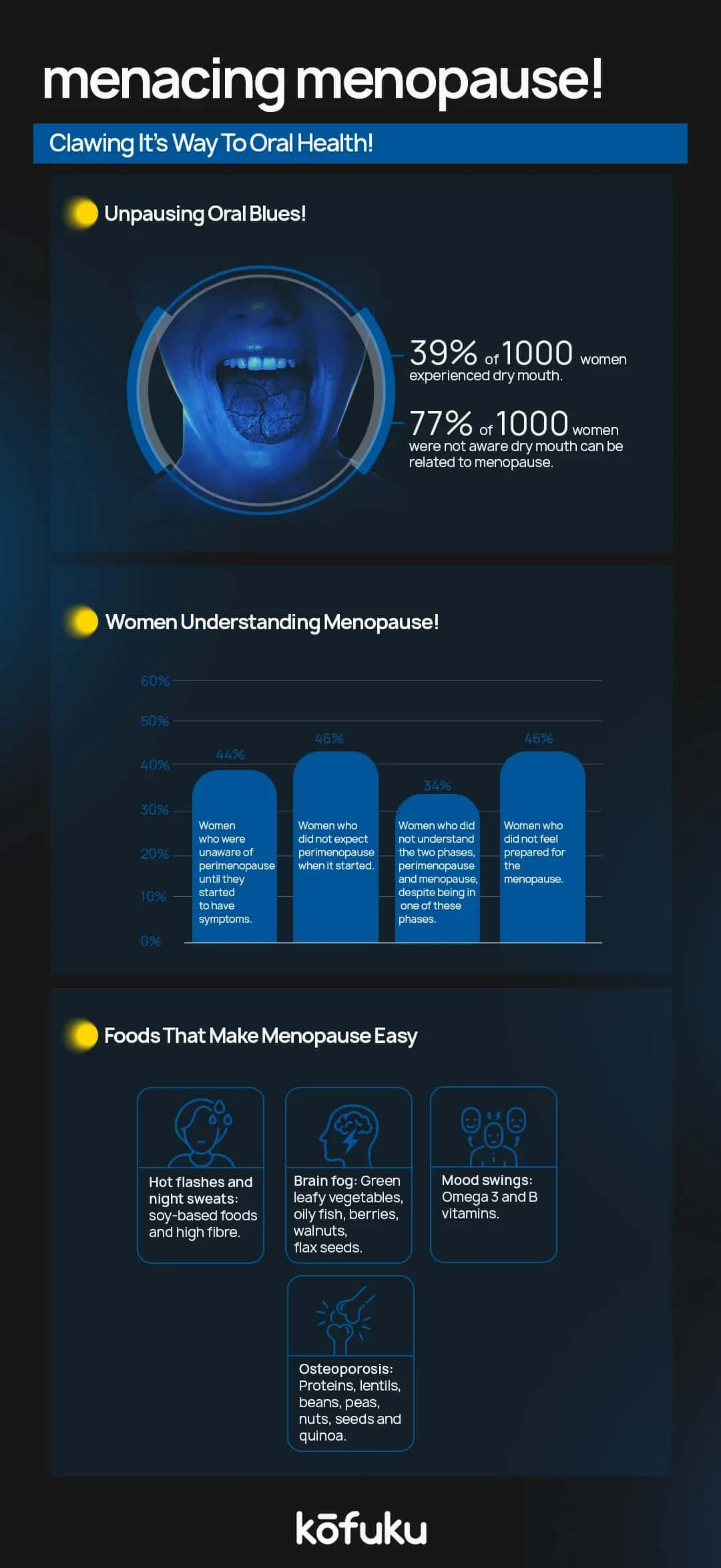Menopause Affects Your Mouth: Major Signs to Look Out For


Introduction
Did you know your gums can have mood swings? Sounds bizarre, right? We’ve always thought of oral health as something you manage with brushing, flossing, and the occasional guilt trip from your dentist.
Teeth are solid, predictable, and, frankly, kind of boring. Gums? They just sit there, silently, supporting like a loyal friend.
But then one day, seemingly out of nowhere your mouth starts acting weird. Your gums get sensitive, your breath isn’t as fresh, and your mouth feels like its been going through a drought.
And no, this isn’t some rare tropical disease or a forgotten side effect of eating too many sour candies. It’s MENOPAUSE.
Let’s dive into the lesser known, slightly drastic world of how menopause affects your oral health because your gum deserve a VOICE too.
Sayonara Oestrogen, Hello Chaotic Mouth
Oestrogen, she used to be your BFF. Kept your bones strong, your mood level, and your gums in check. But now? She’s ghosting you. And with her dramatic exit, your oral health starts acting out.
When estrogen levels drop, your salivary glands might decide to go on a coffee break... permanently.
Enter - dry mouth, a.k.a the Sahara desert of oral conditions. And guess what thrives in drive mouths? BACTERIA. Lots of it. The kind that throws parties on your teeth and leaves plaque mess behind.
Gum Drama - Bleeding and Swelling
Let’s get one thing straight - menopause just doesn’t mess with your mood. It also turns your gums into tiny drama queens. They get inflamed, swollen, and overly sensitive…sort of like you when someone eats the last doughnut you saved for later.
This condition even has a name: menopausal gingivostomatitis. It sounds fancy, right? But it’s basically your mouth throwing its sassy hiss at you (gum inflammation).

What’s That Taste?
Got that metallic taste in your mouth? Like you licked a penny/coin for no reason? Welcome to another weird symptom, that nobody warned or mentioned in health class.
It’s common during menopause and often linked to - you guessed it - HORMONES and dry mouth. However, changes in your taste buds can happen as you age. But because of menopause, symptoms such as decreased saliva play a huge factor.
It’s not limited to metal taste; one can taste bitter and salty in their mouth even if they haven’t consumed anything.
But a side note - There are ways you can tackle the different taste in your mouth. For example, add honey to combat the bitter taste and lemon to minimize the sweetness. Get creative with masalas because if not now then when?
Suddenly, Doctor Visit Doesn’t Look That Bad
With the drop in estrogen level, you can expect the lining of your gum to be thinner. Making it more open for injury and susceptible to tooth pain and sensitivity.
According to studies, estrogen slows the breakdown of bones. And when the estrogen hormone declines, bone loss increases. So when bone density is compromised around your mouth it could lead to loose teeth, decay, and loss of teeth (this time not even the tooth fairy can save you).
Say Hello to Face Mask - Oral Infection
Who would have thought along with pain around the mouth you could get an infection too? Oral thrush is often due to fungal infection i.e., the overgrowth of Candida albicans causes it.
The main reason? Your hormones are in a rollercoaster ride so it can affect the overgrowth of Candida albicans. You could experience raised sores or white patches around your mouth, difficulty swallowing, burning throat, and redness.
Thrush normally goes on its own within one - two weeks. You could try home remedies like rinsing your mouth with warm water and brushing and flossing at least once a day.
But if the symptoms persist, you may consult with your health practitioner. Chances are they will recommend lozenges, liquid solutions, and antibiotics.
Final Gun - Burning Mouth Syndrome (BMS)
As clear as the name can get, the burning sensation can be around the oral mucosa. The soft tissue inside the mouth can feel burned, tingled, tender, hot, or numb. This mix of sensations is felt around various parts of the mouth, but the most common is on the tip of your tongue.
The sensation can get worse during the day since you are communicating and eating more but it can even get unbearable by the evening. And of course, the intensity of pain varies from person to person.
Remember, the first thing to do if you or your loved one suffers from BMS is to avoid food that causes inflammatory reactions, such as sugar, artificial sweeteners, and gluten.
Visit a doctor and try treatments that would best fit your BMS because it doesn’t necessarily arrive after menopause. There could be an underlying condition behind the burn hence more research is required to understand and treat BMS that occurs with no proper cause.

Tips For Healthy Teeth During Menopause
Don’t worry; I cannot just leave you hanging there, after warning you about the signs you should look out for during menopause and oral health that go hand in hand. Here are a few -
-
Brush and floss twice a day if possible.
-
Use mouthwash to get that extra layer of protection and fresh breath.
-
Change your toothbrush regularly.
-
Eat nutritious meals and avoid sugar because they are known for being harmful to the teeth.
-
Drinking water to combat dry mouth.
-
Regular visits to the dentist. Don’t wait till you’re dying with pain.
-
Avoid tobacco and alcohol since they’re harsh on the mouth.
-
Skip the spicy foods because your mouth can’t handle all the crises at the same time.
These are only preventions and in no way am I stating that it would free you from the pain or the possibility of encountering one. What it can do is help ease the pain and give you hope.
Conclusion
Menopause is wild enough without the surprise dental drama. But knowing what’s going on inside your mouth (and your body) helps you stay ahead of the game.
You might not be able to control the hot flashes or sleepless nights, but hey, you can control your oral hygiene.
So next time if your mouth feels weird and your taste buds start acting up don’t blame yourself because that’s the way our body is built. Follow the remedies we have provided and visit a dentist.
FAQs
Can menopause really affect my mouth?
A. Yes, hormonal changes, especially the drop in estrogen, can lead to dry mouth, gum problems and changes in taste.
Why is my mouth so dry all of a sudden?
A. Low estrogen levels during menopause can reduce saliva production, causing dry mouth, bad breath - a common but annoying symptom.
Are bleeding and swollen gums normal during menopause?
A. They can be. Many women experience gum inflammation or sensitivity due to hormonal imbalance, a condition called menopausal gingivostomatitis.
Can menopause make me more prone to cavities?
A. Yes, dry mouth means less saliva to wash away food and bacteria, so your risk for tooth decay and gum disease can go up.
What can I do to keep my mouth healthy and ease the discomfort?
A. Stay hydrated, brush and floss daily, chew sugar free gum and load up on calcium and Vitamin D.
As for easing severe pain, you should consult with your dentist.




